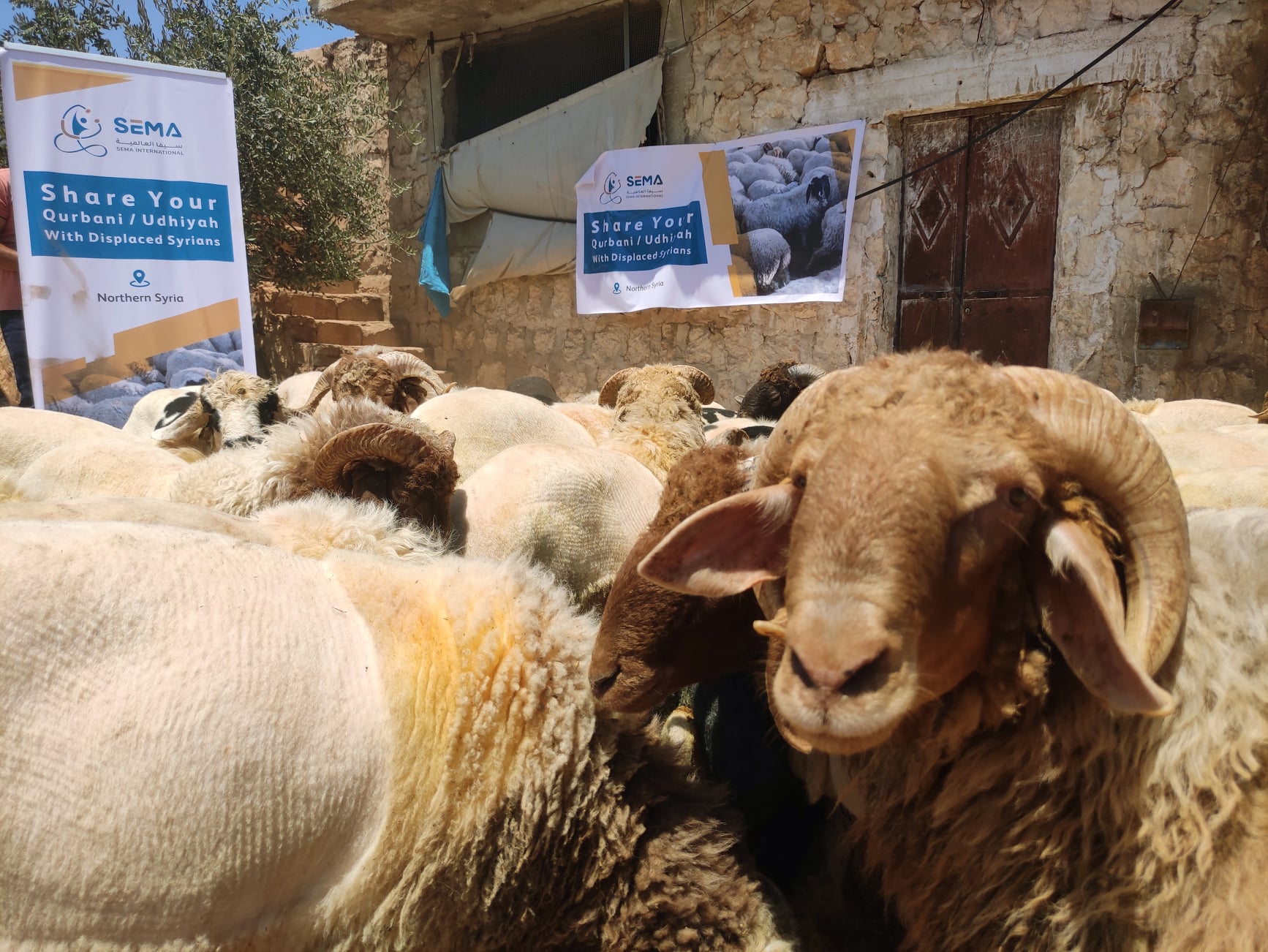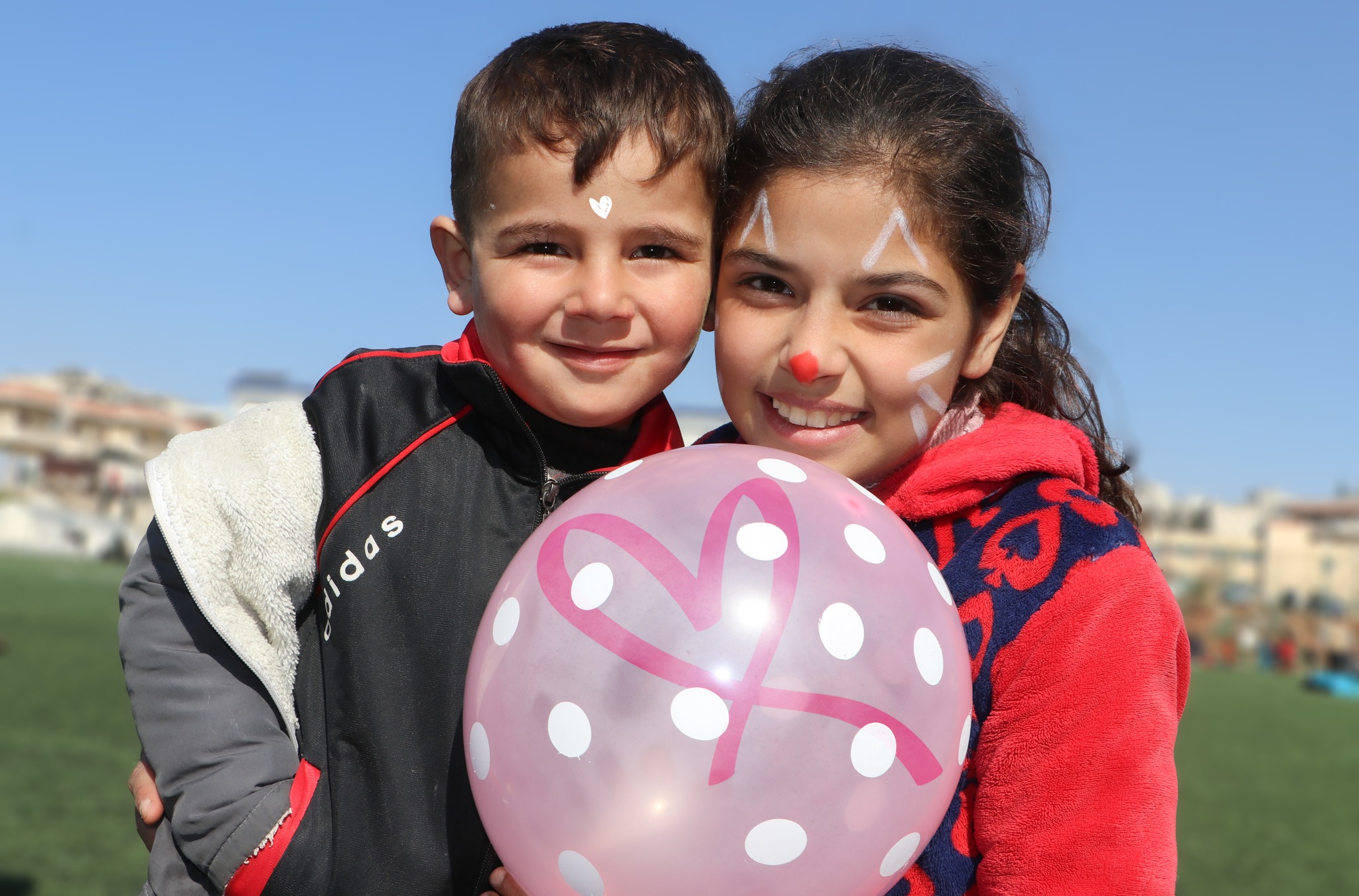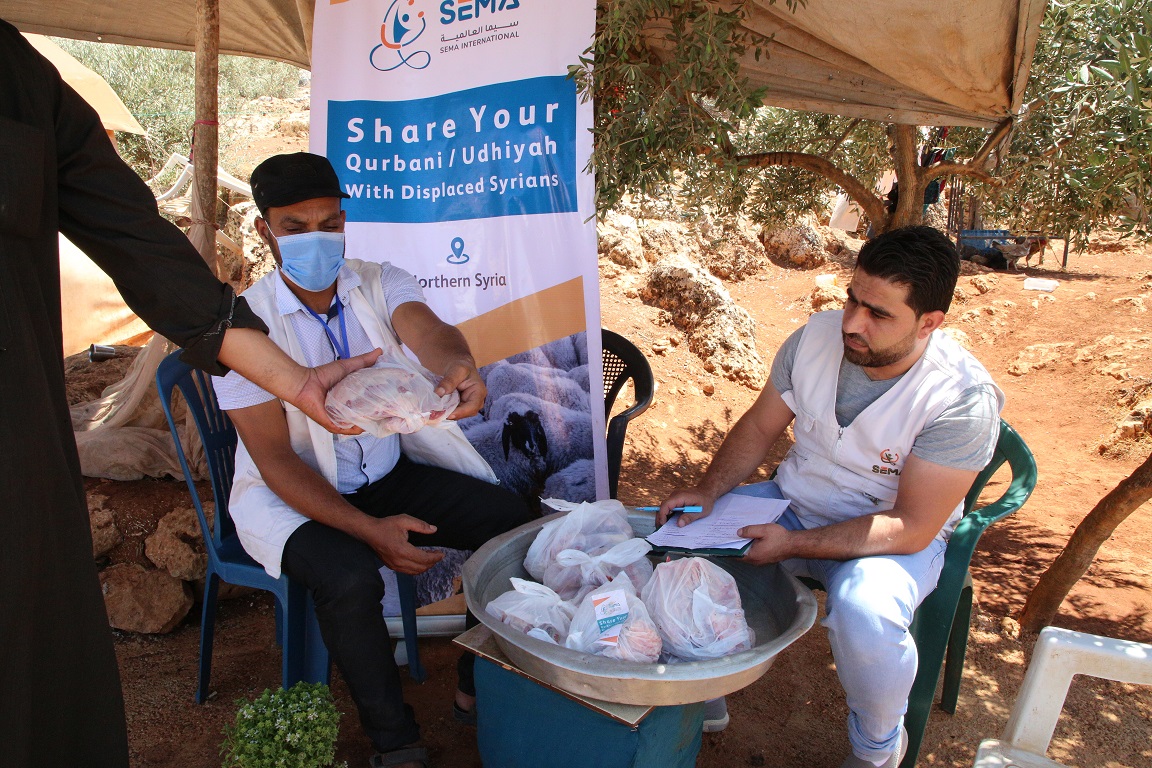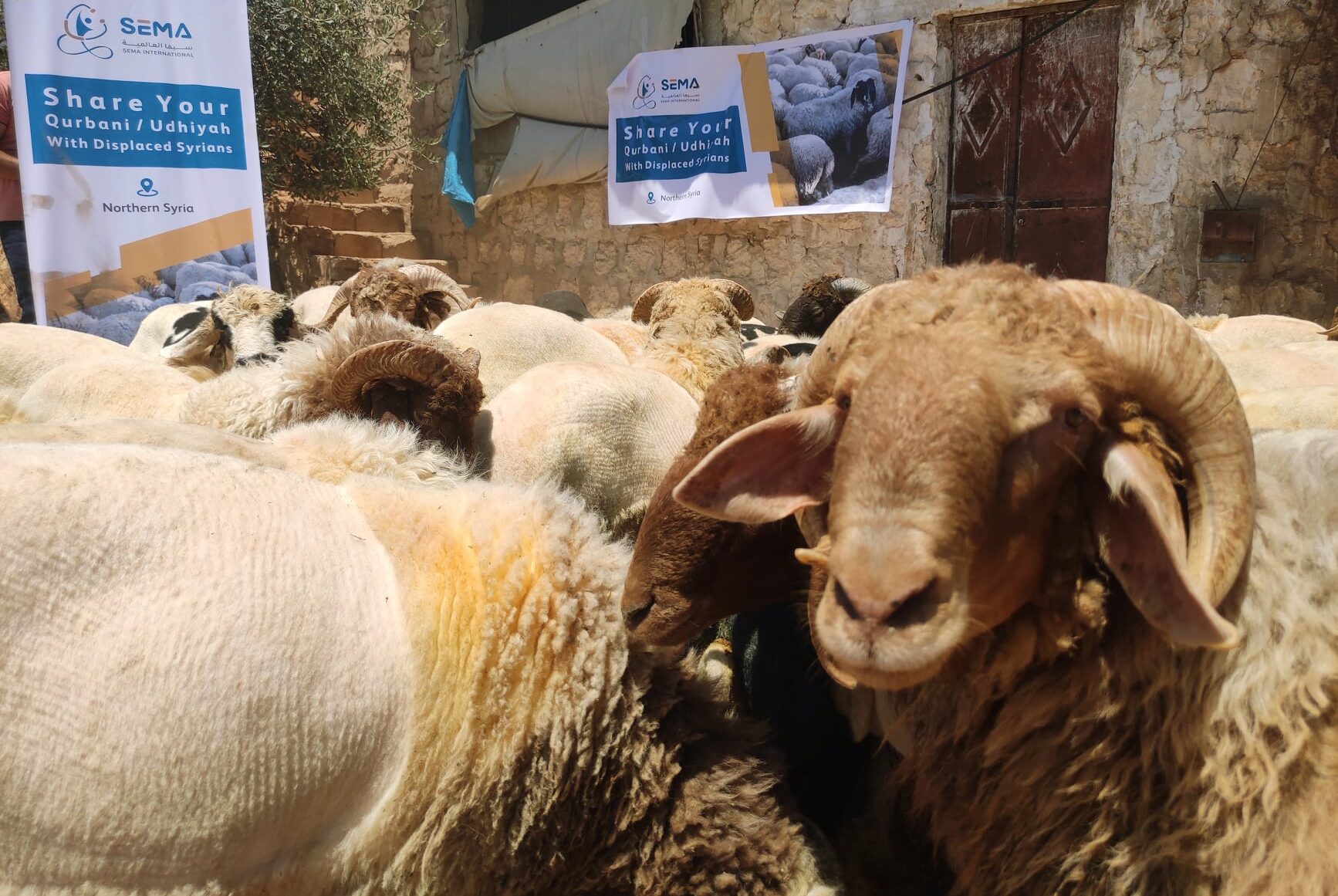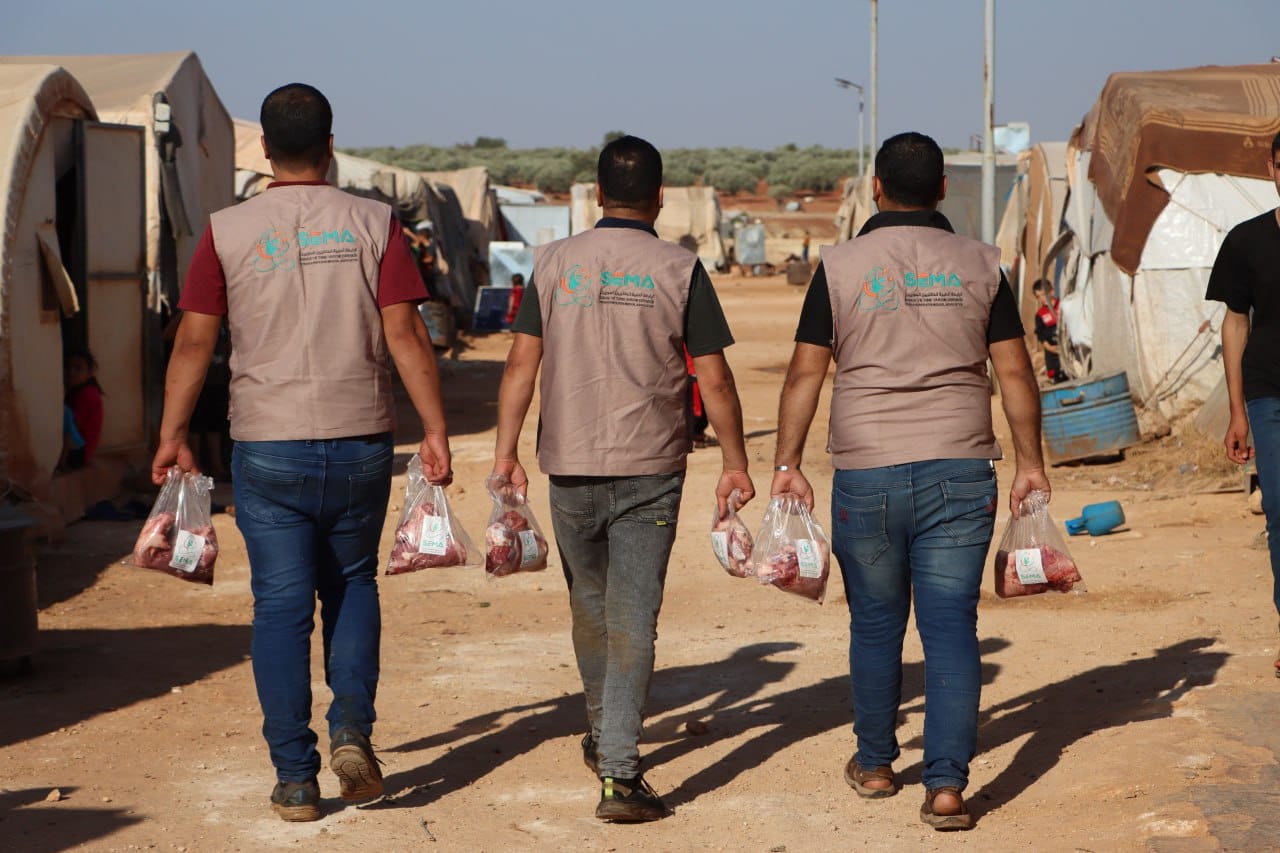Qurbani, or Udhiya, is an Islamic practice that involves sacrificing a livestock animal during the festival of Eid al-Adha.
This celebration comes to mark the event when Prophet Ibrahim (AS) was commanded by Allah (SWT) to sacrifice his son, Prophet Ismail (AS).
Qurbani holds great significance in Islam as it marks the act of devotion performed by Prophet Islamil (AS) and serves as a reminder to remember the vulnerable and needy categories in the community.
This article will further explore the importance of Qurbani to Muslims as well as SEMA’s efforts to help refugee communities with Qurabni donations.

Definition of Qurbani
Qurbani or Udhiya is an Islamic practice that involves sacrificing a livestock animal during Eid al-Adha.
This festive occasion usually takes place between the 10th and the 12th of the month of Dhul Hijjah, the last month in the Islamic calendar.
This celebration comes to commemorate the event when Prophet Ibrahim (AS) was commanded by Allah (SWT) to sacrifice his son, Prophet Ismail (AS).
Yet Prophet Ismail (AS) was saved as he was replaced by a livestock animal at the last moment.
Such an occasion pays tribute to the resolute will of the Prophet Ibrahim (AS) to please Allah (SWT), even when such a decision conflicted with his love for his only son.
Significance of Qurbani in Islam
Qurbani holds great significance in Islam as it marks the act of devotion performed by Prophet Islamil (AS).
The prominence of such an occasion lies in celebrating the dedication and willingness of Prophet Ibrahim (AS) to sacrifice his own son in order to obey Allah (SWT).
The aim behind celebrating Qurbani is to instill the same devotion and dedication within Muslims towards Allah (SWT).
It is meant to instruct Muslims on devotion and obedience to Allah (SWT). It also serves as a reminder for Muslims to remember the vulnerable and needy categories in the community by donating parts of the Qurbani to them.
The historical background of Qurbani
The practice of Qurbani dates back to the Prophet Ibrahim (AS) when he had a dream of sacrificing his own son, Ismail (AS), in obedience to Allah (SWT).
Allah the Almighty says in the Qur’an: “And when he reached with him [the age of] exertion, he said, “O my son, indeed I have seen in a dream that I [must] sacrifice you, so see what you think.” He said, “O my father, do as you are commanded. You will find me, if Allah wills, among the steadfast” (As-Saffat:102).
Origins of Qurbani
Allah commanded Prophet Ibrahim (AS) to sacrifice his only beloved son Prophet Ismail. Although he loved his son dearly, Prophet Ibrahim complied with Allah’s (SWT) command to demonstrate his complete devotion to the Almighty’s will.
Qurbani in the time of Prophet Ibrahim (AS)
In compliance with Allah’s will, Prophet Ibrahim (AS) took his own son to Mina (a place near Mekka) to slaughter him.
As the Prophet was getting ready to sacrifice his son, Prophet Ismail, Allah awarded their compliance to His will and patience with a goat sacrifice.
Such a practice was then followed by Muslims worldwide every year on Eid al-Adha.
Qurbani in the life of Prophet Muhammad (SAW)
The Prophet (PBUH) said: “It is the Sunnah of your father Ibrahim (as). For every hair of the Qurbani, you receive a reward from Allah (SWT)” (al-Tirmidhi).
The importance of Qurbani in Islam
Qurbani represents Prophet Ibrahim’s (AS) and Prophet Ismail’s (AS) unflinching loyalty and submission to the will of their Creator.
In addition to signifying an act of devotion to Allah (SWT), it is also a reminder of the importance of giving to the poor and needy segments of society.
The practice of Qurbani is also prominent for a number of reasons, including:
Qurbani as a form of worship
Qurbani is an annual sacrifice of an animal that Muslims perform during the days of Eid al-Adha every year as a sign of their submission to Allah’s commands. Qurbani also marks the completion of the Hajj obligation.
Qurbani as a reminder of sacrifice and submission
Qurbani is an act of worship by which believers testify that they are ready to sacrifice their beloved belongings for the sake of pleasing their Lord.
Qurbani as a means of developing empathy and compassion
Qurbani serves as a crucial reminder to donate to the less fortunate categories of society. It reminds us to be empathetic and compassionate toward those most in need in society and to feel their pain.
Conditions for Qurbani
Qurbani is expected to be performed by Muslims who have reached the age of puberty, are able-bodied, and meet the rules of zakat.
Moreover, Qurbani is obligatory on adult, sane male, and female Muslims who have an excess of wealth.
The animals chosen for Qurbani should be in good health and fulfill the following conditions:
- Have intact horns.
- Have at least half their teeth.
- Have not lost a third or more of their ears or tails.
- Have an intact sight or have retained a third or more of their sight.
- Are able to walk with no limp or lameness.
- Are well-fed and not thin or lean.
How to perform Qurbani?
According to the sunnah of the Prophet (PBUH), there are some rules that should be followed when slaughtering a livestock animal for Qurbani, these are:
- Using a sharp knife.
- The knives should not be sharpened in front of the animal.
- Animals should not be slaughtered in the presence of another animal.
- Muslims should utter the words “Bismillahi Allahu Akbar” when making the sacrifice.
- The animal should only be skinned once its body is cold.

Donate your Qurbani to SEMA
The true meaning of Eid is lost when our brothers and sisters are suffering in camps and are starving.
How can one celebrate when millions of displaced people have forgotten the joys of Eid and the taste of its special delicacies?
That is why the Syrian Medical Association for Syrian Expatriates (SEMA), makes sure to bring your Qurbani donations to those in need inside destitute refugee camps.
We must remember that a neighbor may be hungry, and we should only rest once all are fed.
Donate now at the below link to help feed a whole family with your Qurbani donations and bring the joys of Eid to them!
Donate now at the below link and help feed a whole family with your Qurbani donations and bring the joys of Eid to them!
FAQ
What is the purpose of Qurbani in Islam?
The purpose of Qurbani is to honor the sacrifice the Prophet Ibrahim (AS) was prepared to make to demonstrate his devotion to Allah’s commands.
What does the Qur’an say about Qurbani?
Allah the Almighty says in the Qur’an: “And when he reached with him [the age of] exertion, he said, “O my son, indeed I have seen in a dream that I [must] sacrifice you, so see what you think.” He said, “O my father, do as you are commanded. You will find me, if Allah wills, of the steadfast” (As-Saffat:102).
What did Prophet Muhammad say about Qurbani?
The Prophet (PBUH) said: “It is the Sunnah of your father Ibrahim (as). For every hair of the Qurbani, you receive a reward from Allah (SWT)” (al-Tirmidhi).
Is Qurbani necessary in Islam?
Performing Qurbani is necessary in Islam because it is not only an act of obedience to Allah (SWT), but also an important act of charity to the poor in the society.
Resources
Read More

